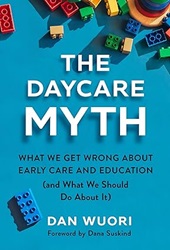What we Get Wrong About Early Care and Education
(and What We Should Do About It)
by Dan Wuori
Teachers College Press, 2024. 125 pages.
Review written January 2, 2025, from my own copy, ordered via Amazon.com.
Starred Review
2024 Sonderbooks Stand-out: #2 More Nonfiction
I read this book very quickly at the end of 2024, because I was quite sure it would end up being a Sonderbooks Stand-out, and I didn’t want to wait a year to highlight it.
Dan Wuori has run my favorite account on Twitter for years, and now he’s on Facebook and Bluesky as well. His daily posts (my favorite way to start my day) include an adorable video of a baby or toddler – and then Dr. Wuori explains how the video shows the brain development going on in the child.
And that’s what’s going on in this book, too. Dan Wuori is a spokesperson for babies’ brains! He explains that the years from prenatal to three years old are the most important in a human’s life because our brains are wiring to learn.
And what is the Daycare Myth? It’s the pervasive tendency to downplay this importance and treat places that tend babies and toddlers as only needing to meet their outer physical needs. When the truth is, they are learning centers and need to provide a stable environment for those tiny brains to make the neural connections that are so vital.
That the early years are for caring – and not education – is a notion long (if mostly inadvertently) perpetuated by policymakers. Even those seeking to advance investments in early childhood are prone to framing their arguments around a desire that children “come to kindergarten ready to learn” – as if this is when and where learning begins.
This book is short, and it starts by effectively making the case, using research results, that those first years are vitally important for brain development, and investing in education for those years will pay off abundantly as those children grow older.
All of the ideas in this book are based around “The Three Simple Truths of Early Development”:
(1) Learning begins in utero and never stops.
(2) The period from prenatal to age 3 is a uniquely consequential window of human development during which the fundamental architecture of the brain is “wired.”
(3) Optimal brain development is dependent on stable, nurturing relationships with highly engaged adults.
This is a book on policy, but all along, the author makes a bipartisan case. The benefits of investing in early childhood education will pay off for all of us. He’s not talking about government taking it over completely – and shows why that wouldn’t actually work. But there are things that government can do to help, and things both political parties can and should get behind.
And all of it is based on his strong case that early childhood education is a public good.
We are already paying for the repercussions of not investing in it. It will benefit everyone if we give our attention to this time that makes the most difference in people’s lives.
The chapter titles give you an idea of the flow of Dr. Wuori’s argument:
(1) Daycare Doesn’t Exist
(2) Something for Everyone: The Bipartisan Case for Early Childhood Investment
(3) America’s Failing Child Care Market
(4) How Not to Solve the Child Care Crisis: Imperfect Solutions and Policy Pitfalls
(5) A Wholesale Transformation of America’s Early Childhood Landscape
And that chapter about solutions has some great ideas and even some case studies of states with “promising practices” as they tackle the problem.
Now, you might think I have no skin in the game – my kids are grown adults. But I do remember what it was like, and it feels like I only recently got out of the debt we got into when we tried to get by with me working only part-time so I could be with our kids. (Technically, I suppose it was more recent things, but let’s just say that this set us back.)
And he does talk about all the scenarios. It’s a public good to support babies’ brain development in stable, nurturing relationships, whether that’s at home with their own parent or in an early education setting. In an appendix at the back, he gives ideas for reaching out to elected leaders, especially for parents and professionals.
Bottom line: Read this book!
More than any partisan book I’ve recommended on my website, I hope that people of all political persuasions will give thought to the ideas Dr. Wuori presents and implement as many as they can. Let’s use public policy to promote this public good.
As Dr. Wuori puts it:
As we wrap up our conversation, I want to take just a moment to reiterate why I wrote this book and what I hope it might help to accomplish. If you take nothing else away from our time together, let it be this: The early years are uniquely consequential – and infinitely more impportant than our nation’s public policy might lead you to believe.
Find this review on Sonderbooks at: www.sonderbooks.com/Nonfiction/daycare_myth.html
Disclosure: I am an Amazon Affiliate, and will earn a small percentage if you order a book on Amazon after clicking through from my site.
Disclaimer: I am a professional librarian, but the views expressed are solely my own, and in no way represent the official views of my employer or of any committee or group of which I am part.
What did you think of this book?

I really appreciate the way this review captures the heart and emotional depth of this story. I am inspired to see such thoughtful reflections on the book’s themes.